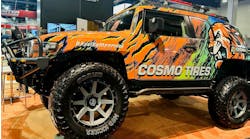The words were informative and impactful. Unfortunately, they were interpreted negatively by the tire dealers in attendance. As a result, they sent the wrong message.
“Profit is more important to us than volume,” said a top Nokian Tyres plc executive to dealers from the United States and Canada during a recent trip to Finland. The trip included a plant tour at the company’s headquarters in Nokia, and winter tire testing in Ivalo, located 200 miles north of the Arctic Circle in Finnish Lapland.
Nokian is not one of the largest global tire manufacturers, but it may be the most profitable. In 2012, Nokian posted net sales of $1.6 billion and a high net income-to-sales ratio of 21%. By comparison, here are the profitability ratios of some of the largest tire manufacturers: Groupe Michelin, 7.3%; Continental AG, 6%; Yokohama Rubber Co. Ltd., 5.8%; Bridgestone Corp., 5.6%; Cooper Tire & Rubber Co., 5.2%; Goodyear Tire & Rubber Co., 1%.
At an informal gathering following the announcement, a dealer told me that he and a number of other dealers took offense at the executive’s statement. In part, they thought the company could be more competitive with its pricing.
Now for the moment of truth.
“I know your magazine makes money from advertising,” he said. “I’m guessing you won’t say anything about what we think because it will reflect badly on Nokian. I understand that. We both know which side your bread is buttered on.”
I will share with you my answers to his comments, because it is important for you to know what Modern Tire Dealer is all about.
Our purpose is to help independent tire dealers run their businesses more profitably. That’s about as simple as it gets.
We serve as an information pipeline from suppliers to dealers. If they have something they want you to know, they tell us and we write about it. In addition, if we find something out about a company that we think will advance our purpose, we write about it.
However, as an editor, it is my responsibility to make sure we pass along the information in a clear, concise and credible manner. That means I don’t print everything I am told verbatim, at least without making sure I am passing it along accurately.
If I have a question about what someone said, I will ask about it. Perhaps it doesn’t make sense, or isn’t the whole truth. “This is what you said. What did you mean?”
My purpose is not to find the seamy underbelly of a company. I am not Jerry Springer. I deal in facts that I know will affect your bottom line for the better. And yes, I often rely on my experience to determine what needs to be written about or included in a story.
When I heard the Nokian executive say profit was more important to the company than volume, I immediately knew I would have to follow up on that. The profit part is pretty self-explanatory, and a company shouldn’t have to apologize for making money.
If a company has a healthy financial statement, then its customers are more likely to be better off, too. But at the expense of volume?
The key was determining what was meant by volume. To meet demand, Nokian had increased capacity. It had opened a plant in Russia in 2005, and was producing 15 million more consumer tires annually because of it. The same executive said that not only could Nokian expand capacity in Russia rather rapidly, but also would build a third plant if demand outpaced supply.
I also talked with the dealers in attendance, who said they had not had any real fill-rate problems with Nokian.
By choosing profitability over volume, the company meant that it favors sustainable growth. It was not willing to expand beyond its core markets in Scandinavia, Russia, Central Europe and, to a lesser extent, North America. That may change in the future, but for now, Nokian can meet projected demand and more.
Had Nokian been having fill-rate problems, I would have asked someone about it. Usually, companies will go on record when they have supply issues because it gives them the opportunity to let dealers know what they are doing about the problem.
I hope this clears up any misunderstanding, Ryan! As for any lingering pricing problems, the market will take care of that over time. ■
If you have questions or comments, please email me at [email protected].
Want more of Bob Ulrich's editorials? Choose:
Policy control: Do you allow employees to bring guns to work?




